|
|
|
Sort Order |
|
|
|
Items / Page
|
|
|
|
|
|
|
| Srl | Item |
| 1 |
ID:
152097
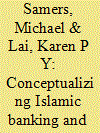

|
|
|
|
|
| Summary/Abstract |
In response to the limited engagement with critical social science concerning the governance of Islamic banking and finance (IBF), this paper compares and conceptualizes the development and governance of IBF in Malaysia and Singapore. We argue that IBF governance in Malaysia and Singapore can be distinguished on the basis of ethnic politics, moral suasion, product demand, product innovation, and the character of state practices. Concerning the latter, we contend that the political economy of both countries can be characterized as broadly involving a ‘neoliberal-developmentalism’, but we nuance this by positing a transition in Malaysia from a ‘semi-developmentalism’ in the 1980s to what we call an ‘Islamic and internationalising ordoliberalism’ beginning in the 2000s. In turn, the governance of IBF in Singapore involves a combination of neoliberal developmentalism, which nonetheless also entails some form of Islamic ordoliberalism.
|
|
|
|
|
|
|
|
|
|
|
|
|
|
|
|
| 2 |
ID:
148620
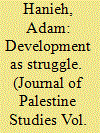

|
|
|
|
|
| Summary/Abstract |
The occupied Palestinian territories (oPt) are a major recipient of global aid flows, ostensibly aimed at improving development outcomes for the Palestinian population. This article presents a critical analysis of the ways that development is being conceived and practiced by major actors in the oPt. By analyzing different conceptions of power, the article examines how dominant approaches to development hide the ongoing reality of Israeli settler colonialism by dehistoricizing Zionism and its project; incorporating the structures of Israeli occupation into official Palestinian development strategy; and promoting an economic perspective that views development as an objective and disinterested process operating above (and outside) power relations. After considering some of the ramifications of current approaches to development, the article concludes with brief remarks on how this critique can help to reframe and articulate an alternative strategy.
|
|
|
|
|
|
|
|
|
|
|
|
|
|
|
|
| 3 |
ID:
116444
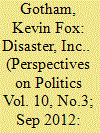

|
|
|
|
|
| Publication |
2012.
|
| Summary/Abstract |
This paper examines the problems and limitations of the privatization of federal and local disaster recovery policies and services following the Hurricane Katrina disaster. The paper discusses the significance of the Homeland Security Act of 2002 in accelerating efforts to devolve and privatize emergency management functions; the reorganization of the Federal Emergency Management Agency (FEMA) as a service purchaser and arranger; and the efforts by the New Orleans city government to contract out disaster recovery activities to private firms. I situate and explain these three developments in the context of recent trends toward the neoliberalization of state activities, including the privatization and devolution of policy implementation to private firms and non-governmental organizations. On both the federal and local levels, inadequate contract oversight and lack of cost controls provided opportunities for private contractors to siphon public resources and exploit government agencies to further their profiteering interests and accumulation agendas. This article demonstrates how the privatization of emergency management services and policy constitutes a new regulatory project in which the state's role has shifted away from providing aid to disaster victims and toward the management and coordination of services delivered by private contractors.
|
|
|
|
|
|
|
|
|
|
|
|
|
|
|
|
| 4 |
ID:
176050
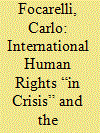

|
|
|
|
|
| Summary/Abstract |
A “crisis” of international human rights is under way. This article focuses on the “neoliberalism and human rights” debate. It argues that the current human rights crisis hinges on the evolution of neoliberalism as a “totalizing project”. A way out may be provided by the notion of the “human person” conceived as the individual in his/her uniqueness and complexity against any form of (market-induced or other) massification. The article concludes by suggesting that we place the (decommodified) human person, empathy, and school/education center stage.
|
|
|
|
|
|
|
|
|
|
|
|
|
|
|
|
| 5 |
ID:
124455
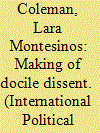

|
|
|
|
|
| Publication |
2013.
|
| Summary/Abstract |
This study is about strategies of neoliberalization in relation to practices of dissent and resistance. It explores how struggles arising in the context of neoliberalization may be subject to entanglement within the very processes they seek to contest and-in so doing-interrogates the political stakes of neoliberal governmental rationality. Drawing upon extensive ethnographic research, I trace the international trajectory of mobilizations against the dispossession visited upon Colombian farmers in the context of BP's investment in oilfields in the mid-1990s. Reasoning through attention to the ways in which this one specific struggle was neutralized, I suggest that a key aim of neoliberal strategies of political control is to accomplish a sort of "political hygiene" by nullifying politically surplus subjects and containing dissent within manageable parameters. The invocation of discourses of rights and civil society can be seen to be integral to neoliberal political rationality in this regard, but rights are comprehended within a symbolic structuration of the population that coincides with neoliberal logics. I suggest that such logics are directed not so much at incorporating the population into a generalized "right of death and power over life," as Foucault famously put it, but at inscribing subjects into networks of unstable and precarious private contract that constrict the wider obligations of population and citizenship commonly associated with liberalism. Discourses of rights, civil society, and development are not antidotes to socioeconomic dispossession or armed repression. Rather, all of these are complementary components of strategies aimed at the domestification of dissent.
|
|
|
|
|
|
|
|
|
|
|
|
|
|
|
|
| 6 |
ID:
177737
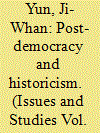

|
|
|
|
|
| Summary/Abstract |
Since Japan’s imposition of export controls against Korea in July 2019 and its following countermoves, including the termination of the General Security of Military Information Agreement, the governments of both countries have presented their own narratives of the origin of this trade war, both of which mirror theories of international politics. Nonetheless, these narratives mask several domestic origins. Most importantly, this paper demonstrates that behind the trade war, there has been a preoccupation of the two governments with mutually irreconcilable version forms of historicism. One is Korea’s pro-naturalist historicism, seeing Korean history as being preordained by the universal laws of human progress and defining Japan as a historical reactionary. The other is Japan’s anti-naturalist historicism, upholding internationalism as a new driving force of history that will transform Japan from a war criminal state into a proper subject in international society while criticizing Korea as being a drag on this transformation. This paper argues that, resulting from decades-long neoliberal politics that have disturbed the state-society balance, the national structure of post-democracy has encouraged each government to push historicism to its limit as an alternative source of political legitimacy in lieu of democratic accountability. Concretely, it shows that post-democracy has determined (1) the historicist framing of emerging conflicts, (2) the government’s legislative struggles to realize historicist policies, and (3) the incontestability of historicist hostility by other ideas in each country.
|
|
|
|
|
|
|
|
|
|
|
|
|
|
|
|
|
|
|
|
|